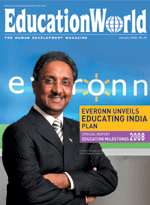Technology pitfalls
 I enjoyed reading your cover story ‘Everonn unveils Educating India Plan’ (EW January). P. Kishore and the Everonn team are doing the country valuable service by spreading computer education and literacy in government schools. In particular, I’m impressed with their unique Vsat learning model using satellite technology to beam high-quality educational content into schools and colleges in rural and small town India. The quality of faculty and curriculums of these education institutions is pathetic, and there is increasing demand from students for high-quality, industry-focused and contemporary learning. Satellite learning is an excellent alternative to fill this lacuna.
I enjoyed reading your cover story ‘Everonn unveils Educating India Plan’ (EW January). P. Kishore and the Everonn team are doing the country valuable service by spreading computer education and literacy in government schools. In particular, I’m impressed with their unique Vsat learning model using satellite technology to beam high-quality educational content into schools and colleges in rural and small town India. The quality of faculty and curriculums of these education institutions is pathetic, and there is increasing demand from students for high-quality, industry-focused and contemporary learning. Satellite learning is an excellent alternative to fill this lacuna.
However, I’ve heard from some of my teacher friends that most school managements, after investing money in fancy computer/e-learning infrastr-ucture, keep their centres shut or use them minimally for fear of damage to equipment. Does the company ensure this doesn’t happen?
ICT companies such as Everonn, should conduct intensive workshops for customer schools and colleges to train their teachers and students to use and maintain Vsat equipment and other computer education infrastructure. If there is fear of technology, little learning will happen.
Saroja Shetty
Bangalore
Implementation failure
I appreciated the Expert Comment by National Knowledge Commission chairman Sam Pitroda on the commission’s achievements since it was formed three years ago (EW January). Like all government commi-ssions and committees, the NKC did a good job of compiling a set of recommendations for reform across the education spectrum. But it has failed in getting any of its proposals imple-mented. Neither has NKC generated any meaningful public interaction with the academic or students’ communities — the most important stakeholders in the education system. It’s more than likely that when the UPA government’s term ends this May, the NKC recommen-dations will be neatly bound and stacked away in some government office for ‘reference only’.
This just shows that to get politicians and policy makers to effect any reform, a mass citizens’ movement is required. NKC should have roped in NGOs, social activists, teachers and students to become its partners and foot soldiers. That would have forced the government to heed to its recommendations. Public opinion is the strongest weapon of reform in a democracy.
Chandrakanth Raghavan
Chennai
Rope in NGOs!
I am excited about the Educating India plan of Everonn Systems Ltd (‘Everonn unveils Educating India plan’, EW January). Indian education needs a massive capacity expansion boost, and the onus of building new schools and colleges is on the private sector. Everonn with its good track record of working with both government and private educational institutions, seems the right company for the job.
However I’d like to sound a word of caution to the Everonn management. The process of getting government permissions for starting new schools/colleges is mired in bureaucratic red tape and delay. So it’s best to get the government on your side by signing up private-public partnership agreements for starting new schools in rural areas, where there is an overwhelming demand for quality education. Moreover, it would be useful for the company to rope in education NGOs that are already running non-formal learning centres in villages and urban areas. With some help and guidance, these centres could be converted into full-fledged schools offering ICT-enabled education.
I wish Everonn all the best in realising its Educating India Plan. India needs such companies driven by enlightened self-interest to harness the potential of its young population.
Gauri Pramanik
Kolkata
Valuable public service
Thank you for the cover story on India’s most innovative school teachers (EW December). Tata Consultancy Services and your publication have rendered great public service by instituting these awards, and celebrating innovative teachers attempting to make children’s learning experiences joyful and fulfilling.
The annual TCS-EW Teachers Awards serve as a timely reminder to teachers that they have a duty to make learning a pleasant and memorable experience for children. Unfortunately the great majority of teachers in India are not aware of this fundamental obligation. Instead, they transform the classrooms into swot shops in which facts and formulae are hammered into students to enable them to excel in examinations.
Therefore it was a joy to read of the innovative pedagogies that the eight finalists — significantly all women — are employing to enable their students to learn rather than cram. I finished my school drudgery several decades ago, and wish I’d had the opportunity of studying under the infinitely more sympathetic and enlightened teachers featured in your issue.
However to strike a discordant note, there seems to be a private schools bias in your magazine. None of the finalists this year is from a government school, some of which — particularly Kendriya Vidyalayas and Jawahar Navodaya Vidyalayas — are excellent.
Nitin Gokhale
Mumbai
Reader contest suggestion
The December 2008 issue of EducationWorld was superb in all ways. I have a suggestion for you. Why don’t you introduce a contest for readers on education-related issues? I’m sure it will be a success.
Mrigank Banerjee
Kolkata